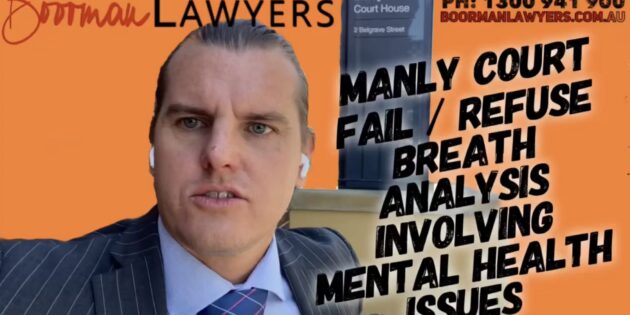Refuse breath analysis offences are among the most serious charges dealt with in Australian courts, as they equate to high-range drink driving under the law. Recently, a complex case at Manly Local Court shed light on the legal processes and potential penalties associated with these charges. This article delves into what a refuse breath analysis offence entails, the role of mental health in defence, and why seeking advice from an experienced Manly DUI lawyer is crucial.
What Is a Refuse Breath Analysis Offence?
Failing or refusing to provide a breath analysis occurs when an individual does not comply with a lawful request from police to submit to a breath test. Under the Road Transport Act 2013, this offence is treated with the same gravity as high-range drink driving, as authorities cannot ascertain the individual’s blood alcohol concentration (BAC).
The penalties for a refuse breath analysis charge are severe, including:
•A mandatory six-month licence disqualification for first-time offenders.
•A mandatory interlock device program for 24 months.
•Fines that may reach up to $3,300.
•Potential imprisonment for repeat offenders or aggravating circumstances.
Case Overview: A Mental Health Perspective
In a recent case handled at Manly Local Court, our client faced a refuse breath analysis charge stemming from a combination of mental health struggles and poor decision-making. The case highlights the importance of addressing the broader context surrounding the offence.
Our client, a long-time sufferer of ADHD, anxiety, and depression, had experienced a relapse in mental health stability. Despite a history of compliance with treatment, she discontinued medication in early 2022. On the day of the offence, she suffered an emotional breakdown and consumed both prescribed medication and alcohol, which led to erratic driving and eventual police intervention.
Key Legal Considerations and Defence Strategies
1. Mental Health Considerations
Mental health issues often play a significant role in refuse breath analysis cases. Courts may consider these factors when determining penalties, especially when presented with compelling evidence, such as:
•Psychiatric reports detailing diagnoses and treatment history.
•Evidence of re-engagement with mental health services.
•Testimonials highlighting the offender’s good character and remorse.
In this case, the court considered our client’s mental health struggles and her proactive steps to stabilise her condition, which were pivotal in achieving a favourable outcome.
2. Compliance and Cooperation with Police
Unlike some offenders in similar cases, our client cooperated fully with police. Her calm and respectful demeanour, paired with a letter of apology, positively influenced the court’s perception. Cooperation can significantly impact sentencing, as non-compliance often leads to harsher penalties.
3. Preparation and Mitigation
To strengthen our client’s case, we prepared a comprehensive defence, including:
•Written submissions detailing the mental health context and remorse.
•Evidence of enrolment in a Traffic Offenders Program.
•Letters of support from family and friends.
•A mapped explanation of the short distance driven, highlighting the lack of harm caused.
The Court’s Decision and Sentencing
The court imposed the minimum penalties for a refuse breath analysis offence, taking into account our client’s mental health, cooperation, and lack of prior offences:
•A six-month licence disqualification backdated to the date of the offence.
•Mandatory enrolment in the interlock program for 24 months.
•A heavily reduced fine of $750, reflecting the client’s financial hardship.
This outcome, while serious, avoided more severe consequences, such as extended licence disqualification or imprisonment.
Lessons from the Case: How a Manly DUI Lawyer Can Help
This case underscores the value of seeking legal advice from an experienced Manly DUI lawyer. Navigating complex factors like mental health and mitigating circumstances requires expertise, meticulous preparation, and strategic negotiation with the prosecution.
A skilled lawyer can:
•Reduce or dismiss charges through negotiations.
•Present strong written and oral submissions to the court.
•Advocate for penalties that reflect the offender’s circumstances and efforts at rehabilitation.
FAQs about Refuse Breath Analysis Offences
What happens if I refuse a breath analysis in New South Wales?
Refusing a breath analysis is treated as a high-range drink driving offence, with penalties including licence disqualification, fines, and potential imprisonment.
Can mental health issues be used as a defence?
Yes, courts often consider mental health factors when determining penalties, provided there is credible evidence of diagnoses and treatment.
Is a refusal charge worse than a drink driving charge?
In many cases, yes. Without a BAC reading, the law assumes the offender’s alcohol level was high, leading to severe penalties.
What is the mandatory interlock program?
This program requires offenders to install an interlock device in their vehicle, preventing it from starting if alcohol is detected on their breath.
How can a lawyer help with my case?
A lawyer can negotiate with prosecutors, present mitigating factors to the court, and argue for reduced penalties based on individual circumstances.
What are the chances of avoiding licence disqualification?
Licence disqualification is mandatory for refuse breath analysis offences. However, a lawyer may help minimise the disqualification period.
Conclusion: Moving Forward After a Refuse Breath Analysis Charge
While refuse breath analysis offences carry significant penalties, this case demonstrates that a thoughtful defence strategy can mitigate consequences. By addressing underlying issues, such as mental health, and demonstrating genuine remorse, offenders can chart a path toward rehabilitation and a brighter future.
If you’re facing a similar charge at Manly Local Court, don’t navigate the legal process alone. Contact a trusted Manly DUI lawyer to explore your options and secure the best possible outcome.
Suggestions for Links
Inbound Links:
•“Learn more about Traffic Offenders Programs.”
•“Explore our guide to high-range drink driving offences.”
Outbound Links:
•NSW Road Transport Act 2013 here.
•Legal Aid NSW resources on Drink Driving Penalties.
Further Resources
• Boorman Lawyers
• YouTube Channel
—
For more informative content, subscribe to our YouTube channel and check out our other videos that might be helpful for anyone going through a similar process.
#SydneyDUILawyer #ManlyDUILawyer #BoormanLawyers
